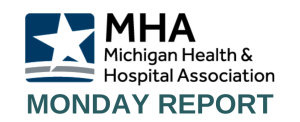The Rural Health Redesign Center and Mathematica are hosting a webinar May 1 from 11 a.m. to noon ET for hospitals interested in the rural emergency hospital (REH) designation. The Rural Health Redesign Center provides no-cost technical assistance to eligible hospitals interested in REH conversion. The webinar will provide an overview of the REH program and the requirements that are important for interested hospitals to consider before converting. Registration for the event is required. Members with questions about the webinar should contact Mathematica. Members with questions about the REH designation in Michigan should contact Lauren LaPine at the MHA.
Tag: REH
MDHHS Releases Proposed Policy on REH Reimbursement
The Michigan Department of Health and Human Services (MDHHS) recently released a proposed policy to establish Medicaid reimbursement methodology for hospitals that convert to the new rural emergency hospital (REH) provider type. Critical access hospitals and rural hospitals with 50 or fewer beds are eligible to apply for the Medicare REH designation effective Jan. 1, 2023.
Hospitals that convert to the REH designation are required to update their enrollment and subspeciality with the MDHHS and must end date their inpatient services. Providers must notify the MDHHS via the Community Health Automated Medicaid Processing System within 35 days of any change to their enrollment information.
The MDHHS will reimburse REHs using existing Outpatient Prospective Payment System (OPPS) methodology. Critical access hospitals that convert to the REH designation will continue being paid based on the higher OPPS payment factor while others will be paid based on their current payment factor. The MDHHS updates the outpatient payment factors annually effective Jan. 1 to maintain budget neutrality following the Medicare update.
Hospitals are encouraged to review existing supplemental payment program policy to evaluate the potential impact. While the proposed policy does not provide specifics, the MHA anticipates that REHs will continue to receive outpatient Medicaid Access to Care Initiative and Hospital Rate Adjustment payments. The MHA will ask the MDHHS to clarify how the REH conversion will impact supplemental payment programs in the final policy. Hospitals are encouraged to review the proposed policy and submit comments to the MDHHS by May 10.
Members that are evaluating REH conversion are encouraged to contact Lauren LaPine at the MHA and members with questions regarding the proposed reimbursement policy should contact Vickie Kunz at the MHA.
MHA Monday Report Jan. 30, 2023

The MHA Legislative Policy Panel convened Jan. 25 to develop recommendations for the MHA Board of Trustees on legislative initiatives impacting Michigan hospitals. The meeting was highlighted by a presentation from MHA multi-client lobbying firm Public Affairs Associates on the new political landscape in Michigan. …
Peters Featured on Paul W. Smith Live from Lansing Broadcast
MHA CEO Brian Peters appeared on Detroit’s WJR News Talk Radio’s Paul W. Smith “Live from Lansing” show Jan. 26 as part of its annual coverage of legislative and policy issues facing the state the morning after Gov. Gretchen Whitmer’s State of the State address. …
MHA and Michigan Hospitals Contribute $45,000 Toward Food Insecurity
The MHA and its member hospitals and health systems contributed a combined total of $45,000 toward the 2022 Michigan Harvest Gathering in an effort to combat food insecurity throughout the state. The annual campaign organized by the Food Bank Council of Michigan concluded Jan. 25 …
Comments Due for 340B Administrative Dispute Resolution Process
The U.S. Department of Health and Human Services (HHS) issued a proposed rule Nov. 30 to establish the 340B Administrative Dispute Resolution (ADR) process implementing a formal manner for resolving disputed claims. The ADR process would provide a forum for addressing …
DEA Change in X-Waiver Requirement
President Biden approved the elimination of the DATA Waiver (X-Wavier) requirement and several other prescribing practice changes when he signed Dec. 29 the Consolidated Appropriations Act, 2023. Changes to prescribing practices include: No longer requiring the X-Waiver to treat …
Virtual Training Offered for FY 2020 Medicaid DSH Audit
Myers and Stauffer LC, Michigan’s contractor for the federally mandated Medicaid disproportionate share hospital (DSH) audits, encourages hospital staff to participate in the upcoming virtual training at 10 a.m. Feb. 28. Hospital staff are also encouraged to view a pre-recorded general DSH …
 MHA Podcast Explores Working Inside Michigan’s Rural Hospitals
MHA Podcast Explores Working Inside Michigan’s Rural Hospitals
The MHA released another episode of the MiCare Champion Cast, which features interviews with healthcare policy experts in Michigan on key issues that impact healthcare and the health of communities. On episode 24, Ross M. Ramsey, MD, president and CEO of Scheurer Health …
The Keckley Report
 The Missing Piece in the Primary Care Physician Shortage Puzzle
The Missing Piece in the Primary Care Physician Shortage Puzzle
“In its latest assessment of the U.S. physician workforce, the venerable Association of Academic Medical Centers (AAMC) projects a shortage of between 17,800 and 48,000 primary care physicians by 2034. …
The keys to mitigating the primary care shortage are multi-factorial, but technology-enabled self-care must be prioritized as a core competence. It’s the missing piece. …”
News to Know
- The Rural Health Redesign Center, the technical assistance provider chosen by the Centers for Medicare & Medicaid Services, in partnership with Mathematica held a with new information for eligible rural hospitals interested in converting to the new Rural Emergency Hospital (REH) designation.
- The MHA and Comprehensive Reimbursement, Inc. are offering a free Occupational Mix educational webinar at 10 a.m. Jan. 31.
 MHA in The News
MHA in The News
The MHA received media coverage the week of Jan. 23 regarding the issue of food insecurity, rural healthcare solutions and hospital viability. The MHA contributed a combined total of $45,000 toward the 2022 Michigan Harvest Gathering during the campaign’s luncheon …
News to Know – Jan. 30, 2023
- The Rural Health Redesign Center, the technical assistance provider chosen by the Centers for Medicare & Medicaid Services, in partnership with Mathematica held a with new information for eligible rural hospitals interested in converting to the new Rural Emergency Hospital (REH) designation. Presenters shared new information regarding the REH Additional Facility Payment Methodology, as well as information regarding timelines and important considerations for hospitals that are considering converting to REH status. Members considering the REH designation should review the slides and fact sheet. Members with questions should contact Lauren LaPine at the MHA .
- The MHA and Comprehensive Reimbursement, Inc. are offering a free Occupational Mix educational webinar at 10 a.m. Jan. 31. Login information for the Zoom event will be provided upon registration, which is required. Members with questions regarding the registration process should contact Crystal Mitchell. Members with questions regarding the occupational mix survey or Medicare wage index should contact Vickie Kunz.
Governor Signs Several MHA Priorities Into Law
Gov. Whitmer signed several bills into law Dec. 22 that were supported by the MHA and passed during the lame-duck session. Among these were expansions to the Michigan Reconnect Program, legislation to allow for a new rural emergency hospital licensure designation and interstate licensure opportunities for psychologists.
House Bills (HBs) 6129 and 6130 – legislation to expand the Michigan Reconnect program – were signed by the governor. The Michigan Reconnect program is a post-secondary scholarship program designed to provide funding to learners over the age of 25 interested in pursuing credentials or post-secondary degrees at community colleges or eligible training programs. Introduced by Reps. Ben Frederick (R-Owosso) and Sarah Anthony (D-Lansing), the package allows for several additional certifications to qualify for the scholarships including high-demand healthcare credentials. The MHA was supportive of the bills and will continue to advocate for future changes to lower the age of qualification for the program.
The legislation needed for hospitals to begin converting to Rural Emergency Hospitals (REHs) in Michigan was also signed into law. Due to limited session days left, the language to allow for REH licensure in Michigan was officially included in Senate Bill (SB) 183. REHs are a new federal designation that will require hospitals to give up inpatient services in exchange for improved federal outpatient reimbursement. Members with questions about the federal rules for REH designation can contact Lauren LaPine at the MHA for more information.
Legislation to allow Michigan to join the Psychology Interjurisdictional Compact (PSYPACT) was also approved by the governor. This will bring Michigan in line with 26 other states to create an expedited pathway to licensure for psychologists who wish to practice telepsychiatry across state lines. HBs 5488 and 5489 were introduced by Reps. Bronna Kahle (R-Adrian) and Felicia Brabec (D-Pittsfield Township) and supported by the MHA to help increase access to behavioral health services in Michigan.
Members with questions on these bills or any other lame duck action may reach out to Adam Carlson at the MHA.
MHA Drafts Comments on 340B Provisions and REH Payment Policies
The MHA has drafted comments in response to the Centers for Medicare and Medicaid Services (CMS) proposed rule to update the Medicare fee-for-service (FFS) outpatient prospective payment system (OPPS) for calendar year 2023. The MHA submitted comments regarding the 340B provisions in mid-August urging the CMS to:
- Restore payment rates for 340B drugs to average sales price (ASP) plus 6%.
- Hold all hospitals harmless for 2018-2022 claims.
- Find new funds to restore 340B payments to ASP plus 6% with no reduction to the outpatient conversion factor.
The MHA also prepared comments in response to the proposed payment policies for rural emergency hospitals (REHs), a new hospital designation established by the Consolidated Appropriations Act, for critical access hospitals and rural prospective payment system hospitals with fewer than 50 beds.
The MHA recently posted hospital-specific estimated impact reports of the OPPS proposed rule on the hospital association reporting portal (HARP) for members to access and encourages hospitals to review the impact of the proposed rule on their operations and submit comments to the CMS by 5 p.m. Sept. 13. The CMS is expected to release a final rule to update the OPPS, including finalization of REH payment policies around Nov. 1 for the Jan. 1, 2023 effective date.
The MHA will provide an updated impact analysis following release of the final rule. Members with questions should contact Vickie Kunz at the MHA.
CMS Seeks Comment on Rural Emergency Hospital Proposed Rule
The Centers for Medicare and Medicaid Services (CMS) recently released a proposed rule to obtain comment on potential Conditions of Participation (CoPs) for critical access hospitals (CAHs) and certain rural hospitals seeking to convert from their current status to be designated as a Rural Emergency Hospital (REH). REHs are a new provider type authorized by the Consolidated Appropriations Act passed Dec. 27, 2020, to address concern regarding the closure of rural hospitals across the country. This new designation provides an opportunity for CAHs and rural hospitals with 50 or fewer beds to continue providing essential services in their communities effective Jan. 1, 2023. REHs would be required to:
- Discontinue providing acute care inpatient services.
- Provide 24-hour emergency services, observation care and can choose to offer additional outpatient services.
- Have an annual per patient average stay of 24 hours or less.
- Have a transfer agreement with a Level I or II trauma center but not precluded from having agreements with Level III or IV trauma centers.
The CMS recently included payment policies related to the new REH in the 2023 Medicare outpatient prospective payment system (OPPS) proposed rule. Medicare outpatient services provided by a REH will be paid 105% of the Medicare OPPS rate with the REH also receiving a monthly facility payment. The CMS proposes a monthly payment of $268,294 for each REH in 2023, with this amount increased annually based on the hospital market basket change.
The CMS proposes that REHs may provide outpatient services that are not paid under the OPPS such as laboratory services paid under the Clinical Lab Fee Schedule (CLFS), which would be paid at the CLFS rate. REHs can also provide distinct part skilled nursing facility (SNF) services which would be paid based on the SNF prospective payment system. Services paid outside of the OPPS such as lab and SNF would not receive the additional 5% payment. The CMS also seeks input on quality measures recommended by the National Advisory Committee on Rural Health and Human Services, and additional suggested measures for the REH quality reporting program. The CMS is seeking additional comments on behavioral and mental health, rural virtual care and maternal health services.
Comments on the proposed CoP rule are due Aug. 29, while comments regarding payment provisions included in the OPPS proposed rule are due Sept. 13. The CMS is expected to release a final OPPS rule around Nov. 1. Members with questions should contact Lauren LaPine at the MHA.
Member Feedback Requested on Rural Emergency Hospital Proposed Rule
The Centers for Medicare & Medicaid Services (CMS) released a proposed rule June 30 that would establish conditions of participation (CoPs) that Rural Emergency Hospitals (REHs) must meet to participate in the Medicare and Medicaid programs. This proposed rule also includes changes to the Critical Access Hospital CoPs. Proposed payment and enrollment policies, quality measure specifications and quality reporting requirements for REHs will be included in future rulemaking. The CMS also modifies the provider agreement regulations to include REHs. The public comment period will end Aug. 29.
The MHA has been working closely with the Michigan Department of Health and Human Services (MDHHS) and the Michigan Department of Licensing and Regulatory Affairs (LARA) over the past few months to develop the licensure criteria and conversion process for eligible facilities in Michigan to convert to an REH after Jan. 1, 2023. The MHA will develop a comment letter in response to the proposed rule and share a draft with small/rural members prior to submission. To include input from Michigan hospitals eligible to convert to an REH in its comments, the MHA has created a brief survey to collect critical feedback that should be submitted by Aug. 1. Members with questions or concerns are encouraged to contact Lauren LaPine at the MHA.

 First Legislative Policy Panel Meeting of 2023
First Legislative Policy Panel Meeting of 2023

 MHA Podcast Explores Working Inside Michigan’s Rural Hospitals
MHA Podcast Explores Working Inside Michigan’s Rural Hospitals MHA in The News
MHA in The News